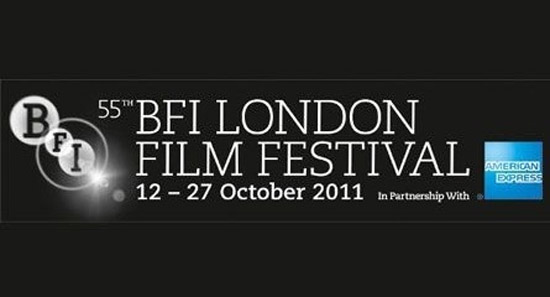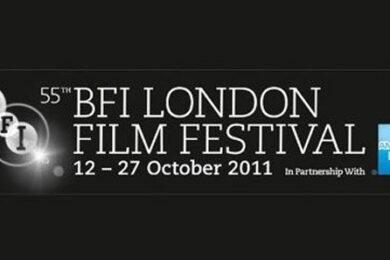The 55th BFI London Film Festival opened this week, and runs from now until 27th October. We present a selection of some of the less well-known films on show during that period.
The Black Power Mixtape 1967-1975
dir Göran Hugo Olsson
Sweden-USA 2011
As the black civil rights movement took off in the United States in the 1960s, Swedish television sent reporters to chase the story from coast to coast, offering enough critical coverage to enrage the editor of TV Guide, who published a cover story protesting its perceived anti-American bias. The footage shot back then has been woven into this gripping documentary, featuring interviews from the time with the major players of the radical wings of the movement, including Newton, Davis, Cleaver, Carmichael and Farrakhan, as well as comments from modern figures reflecting on the footage. Taking the audience year by explosive year through this highly charged era of American politics, the film intelligently lays out the ideas behind a movement whose aims remain largely unfulfilled.
Corpo Celeste
dir/scr Alice Rohrwacher
Italy-Switzerland 2011
A glacially paced character study of taciturn pubescent Marta, who has to decide on her relationship with the Catholic church upon reaching the age of confirmation. Everyone around her in drab Calabria seems to have an idea of how she should live her life, but will she be able to decide for herself? While the film has comedic moments, mostly involving Marta’s religious instruction at the hands of devout believer Santa, any building momentum grinds to a halt, with long shots of washed out windswept streets and crevasses interrupting what action there is. And Marta remains distanced from the viewer, a vacuous presence at the heart of the film, depleting it of energy.
The Dish and the Spoon
dir Alison Bagnall
USA 2011
A slow-burning tale from the slacker school of story-telling. The Dish And The Spoon is essentially a two-hander matching grieving wife Rose, who is running away from her cheating husband, with a young Brit abroad who has been stood up by his American girlfriend. Rose’s decision to pick up this helpless stranger signals a desire on her part to take some control in her life and these two confused losers cling to each other as they try to work out what went wrong in their lives and how they can put it right while holed up in Rose’s parents cabin on the coast of Delaware. As Christmas approaches, they wander the local town, Rose plotting revenge on the woman who poached her husband, watched over by her new ally in a film that opts for low-key observation over showy set pieces.
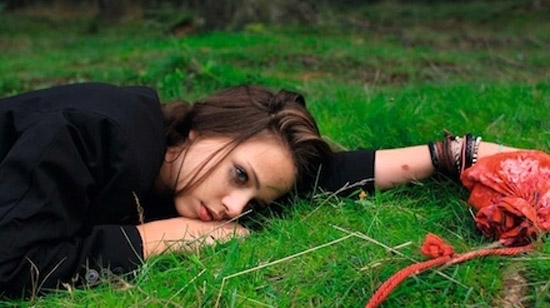
Dreileben
Beats Being Dead (Etwas besseres als den Tod), dir Christian Petzold
Don’t Follow Me Around (Komm mir nicht nach), dir Dominik Graf
One Minute of Darkness (Eine Minute Dunkel), dir Christoph Hochhäusler
Germany 2011
An experiment similar to Advance Party, Dreileben brings together three German directors to film stories in the same setting and sparked by the same event: the escape of a murderer into the fictional town of Dreileben.
Part I, Beats Being Dead, sets up the trilogy with the news that a murderer, Frank Molesch, has escaped from the hospital into the woods around the town. As is his wont, Petzold sets up an intriguing situation and then leaves the viewer hanging, largely ignoring the murderer in favour of a burgeoning love triangle. Johannes, an intern at the hospital, is in an on-off relationship with Sara, the daughter of the head doctor, but finds himself attracted to a Bosnian cleaner, Ana. But, theirs is a tumultuous relationship, constantly disrupted by Johannes’ clumsy comments and Ana’s fragile ego. Sara seems to offer a stable, secure future for Johannes. But, with her domineering father in the background, is it even his decision to make? Johannes is quite a weak character, sustaining neither the viewwer’s interest nor sympathy, and Ana’s character deteriorates into stereotype, making the film a bit unsubstantial.
In Part II, Don’t Follow Me Around, police psychologist Johanna leaves her young daughter in the care of her parents in order to join the investigation. Meeting up with an old university friend, Vera, she discovers they had a former boyfriend in common, which proves extremely unsettling. As Vera and her husband Bruno discover cracks in their relationship, Johanna tries to concentrate on her assignment. Featuring a plethora of intriguing characters and crisp dialogue, this second part of the trilogy far outshines the first and in Johanna finds its star character: her flinty psychologist with a secret is the catalyst for most of the action.
The Fatherless (Die Vaterlosen)
dir/scr Marie Kreutzer
Austria 2011
This outstanding debut features owes a bit to Festen, but puts its own rural Austrian spin on it. The far-flung wings of an extended dysfunctional family gather at their homestead to bid farewell to their dying patriarch, the formidable Hans. But, as they arrive, it becomes clear that each has his or her own unresolved issues with Hans, who had ruled over their commune in the 1980s as something of a dictator in socialist clothing. Responsible Niki, restless Vito, nerve-damaged Mizzi and especially brittle Kyra, who was mysteriously sent away as a child – all have reason to make their peace with Hans. But can they find themselves by stepping out of his shadow? Kreutzer skilfully teases out each character’s story, mixing childhood flashbacks with their interactions as adults to build up a picture of how the commune functioned and what triggered its disintegration.
Free Radicals: A History of Experimental Film
dir Pip Chodorov
France 2010
Never has an article been so important. This is a history, most specifically Pip Chodorov’s history. And when you know that his family is in the business, and that his dad’s television interviews with filmmakers form most of the archive content of this film, then you begin to understand his rather privileged and blinkered view of the subject. Chodorov junior takes Hans Richter as his starting point and then traces a line through Jonas Mekas and his cronies. And then stops. Pretty much everyone who wasn’t part of the 1950s downtown New York scene misses out. The only woman mentioned is Maya Deren, who died 50 years ago. Apparently, nobody has made an experimental film since the 1970s. Except Pip Chodorov. Digital media doesn’t exist. The End.
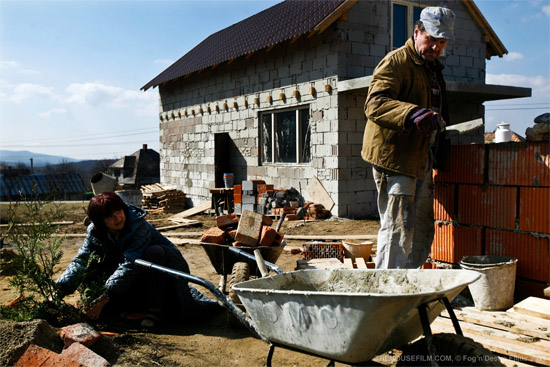
The House (Dom)
dir/scr Zuzana Liová
Slovakia-Czech Republic 2011
The building of a house for a wayward daughter becomes an exercise in parental control for gruff, undemonstrative Imrich, who has already severed ties with one daughter when she got pregnant. He has high hopes for teenage Eva, but her ambition is to go to England to become an au pair, not to stay in their run-down one-horse town. When a stranger with a car appears, she undertakes a clandestine romance that threatens everyone’s plans. Liová has a sharp eye for detail, as well as the big picture, and this is a sure-footed drama that doesn’t sugar coat the pain that family members can cause each other.
Karen Cries on the Bus (Karen Llora en un Bus)
dir/scr Gabriel Rojas Vera
Colombia 2011
Putting a modern Latin spin on Ibsen’s A Doll’s House, this plunks dissatisfied housewife Karen down in a grotty boarding house in Bogota, as she tries to leave her stifling marriage and find gainful employment. Even her mother thinks she should return home to her smug businessman husband Mario. But Karen is determined, and in Patricia, her good-time-girl neighbour, she finds a useful, if unlikely, foil. They have much to teach each other about the important things in life, and while the film unfolds extremely languidly, the last third crackles with energy, as Karen gets to grips with her situation.
Let the Bullets Fly (Rang Zidan Fei)
dir Jiang Wen
China-Hong Kong 2010
With a starry cast led by Chow Yun-Fat (sporting a full head of hair) and director Jiang Wen facing off in this Chinese Western, this should be a rip-roaring action adventure, but ends up more like a bloated vanity piece. Set in 1920, as bandit Jiang invades the territory of Chow’s ganglord, the film plays as a series of lavish set-pieces—bandit attacks, revenge missions, dinner table standoffs—all soundtracked by extremely graphic and gratuitous violence. Disembowelment, gang rape and beheadings are all played for laughs in a film that gets its tone badly wrong, wasting a lot of talent in the process.
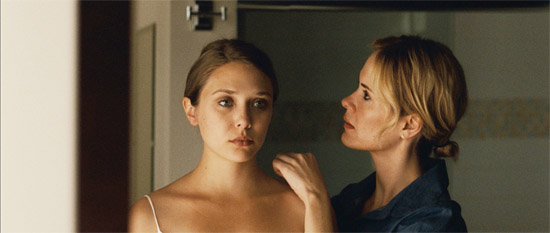
Martha Marcy May Marlene
dir/scr Sean Durkin
USA 2011
This intensely disturbing US indie, Durkin’s debut feature, is about Martha, a fragile woman escaping from a cult and seeking refuge with her older sister, who is more preoccupied with starting a family with her stuffy Brit (natch) husband. Troubled by flashbacks of her life in the cult and her encounters with its control-freak leader, Martha’s story (including the meaning behind her four names) is slowly revealed to the audience, as she unravels before our eyes. Will she be able to throw off this troubled past and make a new life for herself? Elizabeth Olsen (yes, one of those Olsens) is outstanding in the title role, shouldering much of the screen time and carrying the film on her thin shoulders.
Nobody Else But You (Poupoupidou)
dir Gerald Hustache-Mathieu
France 2010
Part black comedy, part thriller, Nobody Else But You reworks the story of Marilyn Monroe into a modern-day cautionary tale on the price of fame, as local starlet Candice LaCoeur narrates her own rise and fall from beyond the grave, while crime novelist David Rousseau tries to solve the mystery of her untimely death, putting his own life in danger, as he pursues the storyline for his next novel. Aided by a witty script, which ropes in political corruption, the comedy of local television and an intriguing cast of supporting characters, including a sympathetic police officer, the film treads lightly on difficult topics while leaving a rather sombre after-taste.
Walking Too Fast (Pouta)
dir Radim Špaček
Czech Republic 2010
Antonin is having a bad day, or a series of bad days: he’s bored with his job, with his house-proud wife and with life in general. Unfortunately, for those around him, Antonin has a badge and a gun and takes out his frustrations on anyone unlucky enough to cross his path. And he has plenty of opportunity, for he is a member of the secret police in 1980s Czechoslovakia, and his job is to monitor the activities of suspected enemies of the state and mess with their lives, if necessary. When his eye falls on dissident Tomas Sykora and his girlfriend Klara, a crane driver, his unsettled state of mind pushes him to disastrous actions. A slow build-up encompasses Antonin, his colleagues, and the state of paranoia in which everyone is suspended, but the film is not nearly as accomplished as its predecessor, The Lives of Others, and deteriorates into violent melodrama.
Women With Cows (Kokvinnorna)
dir Peter Gerdehag
Sweden 2011
Among the end credits are the names Liselott, Rosa and Fille. They are milk cows, and they deserve their star billings, because they are major players in this hard-hitting documentary set on a dairy farm. Owner Britt is in her late ’70s, bent double from an old back injury that never healed and in a daily battle to keep the farm going. She is not entirely alone: her younger sister Inger pops by to help with the milking in between squabbling and complaining. Inger has a family down the road and is constantly chastising her elder sister for the state of the farm, the cleanliness of the house and so forth. Britt, who never married, seems to care for nothing other than her precious cows, even falling asleep in the barn. As the seasons change and Britt’s condition deteriorates, a sense of doom hangs over proceedings. How long can Britt go on? Out of such bleak conditions a truly moving film emerges, with tension arising from real-life family drama.

